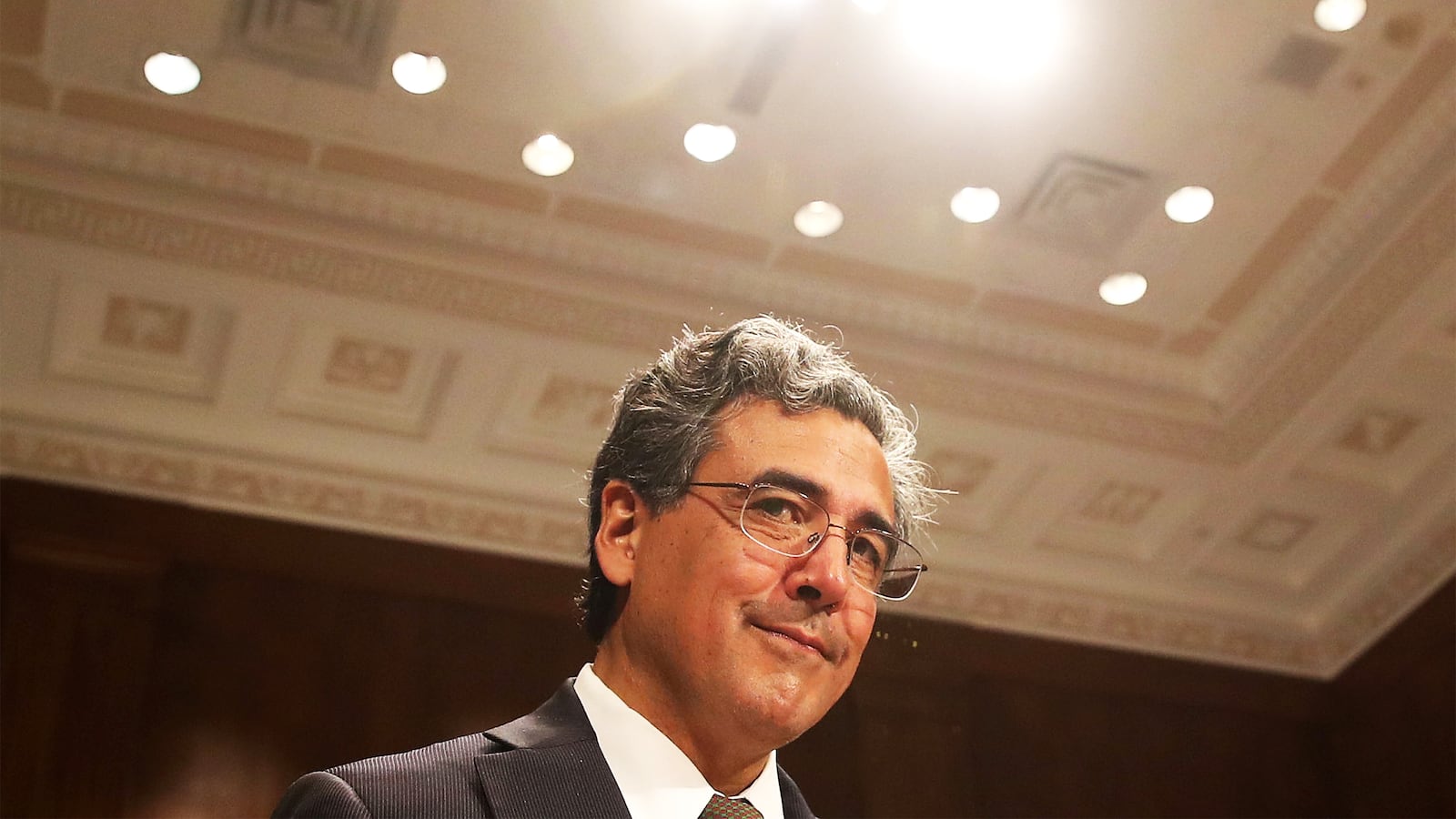Noel Francisco, the U.S. solicitor general, loves cigars. So one day a few weeks into his time on the job—in the 80-year-old Justice Department headquarters in Washington—he stepped out onto the balcony outside his office, to smoke one. But when a Justice Department official spotted him smoking on the balcony, the official got a horrified look and frantically waved for Francisco to come back inside.
Francisco figured he must have broken DOJ rules by smoking on the balcony, one of his longtime friends told The Daily Beast. But the truth was more harrowing: The balcony was structurally unsound and nobody had been allowed out on it for more than a decade. By stepping out for a smoke break, the solicitor general could have made the balcony fall off the building. Just a few weeks into his time as the country’s top appellate attorney, Noel Francisco literally almost broke the Justice Department. Well, at least a little part of it.
Francisco now finds himself attached to a metastasizing controversy that could metaphorically break the department: If President Donald Trump fires Rod Rosenstein, Francisco—as the next-most-senior DOJ official—would take over his responsibility overseeing the special counsel probe. It wouldn’t be his first time in the middle of a politically electric legal showdown. From the Clinton impeachment to Virginia Gov. Bob McDonnell’s showstopping trial, Francisco has had a front row seat to some of the biggest scandals of the last two decades. And he’s built a reputation for being committed to the rule of law and the constitutional order.
Francisco went to the University of Chicago law school and then clerked for former Judge Michael Luttig and Justice Antonin Scalia. After finishing his clerkships, Ted Cruz and Chuck Cooper—Attorney General Jeff Sessions’ personal lawyer—recruited him to join Cooper’s firm. Cooper told The Daily Beast that the three men became fast friends, and that Cruz and Francisco helped him write testimony he delivered to the House Judiciary Committee arguing for Bill Clinton’s impeachment.
“Even now, the three of us remain very good friends, Noel and Ted and I and the two of them together,” Cooper said.
After Election Day in 2000, Cooper dispatched Francisco and Rachel Brand, who would also go on to a senior position in the Justice Department, to Tallahassee, Florida to work on the legal battle related to the recount.
“It was 38 days of 24/7 chaos,” Cooper said. “I would dare say for him—as it was for most of us—it was the most extended period of time when you literally had no time to catch your breath, and barely enough time to catch a few hours of sleep at night. It was just a real death match, if you will.”
His side came out the victors. Francisco went on to work in the White House Counsel’s office under George W. Bush before moving to the Justice Department’s prestigious and secretive Office of Legal Counsel. During that times, as Mother Jones noted, Francisco reviewed one of the 2005 controversial memos that gave the Bush administration legal cover to torture suspected terrorists. After his time in government, he took a position at Jones Day, the firm known for its work for Republican political candidates.
Francisco won lawyer-celebrity status for emerging victorious from two Supreme Court fights: NLRB v. Noel Canning, where he argued that President Barack Obama overstepped his executive power by appointing people during a Congressional recess; and McDonnell v. United States, where he was part of Gov. Bob McDonnell’s appellate defense team. There’s a touch of irony to his work for McDonnell—as his lawyer, Francisco successfully eliminated one favorite tool Justice Department prosecutors had used to prosecute corrupt politicians.
During his time at Jones Day, he worked with Don McGahn, who is now Trump’s White House counsel.
Francisco’s time at the firm and his closeness with McGahn has led to speculation that he would be more politically pliant than Rod Rosenstein, who currently supervises Mueller. Fueling the speculation is Francisco’s part skepticism about special counsels. As Mother Jones observed, Francisco told Congress in 2007, “My own personal belief is that when you hand these issues off to the career prosecutors in the public integrity sections in the US attorneys’ offices in the Department of Justice, those attorneys are generally better able to assess whether a case should be pursued.”
One of Francisco’s long-time friends, who spoke anonymously because of the sensitivity of the matter, said Francisco would be nobody’s tool. But, that friend added, he wouldn’t be a Sally Yates; if Francisco were ordered to do something he thought were unlawful, he would quit, but it’s unlikely he would openly and affirmatively defy the president.
As an appellate lawyer and a conservative, he’s studied constitutional law matters, the separation of powers, and the chain of command. Rosenstein, meanwhile, has dedicated his entire career to one thing: prosecutions. As a professional matter, Rosenstein has spent less time grappling with questions about the Constitution and presidential powers. So people close to both Francisco and Rosenstein said Francisco has likely put much more thought into the constitutional order than Rosenstein has. And it’s likely Francisco is quite familiar with an argument many conservative lawyers make: that Trump has the power to abolish the regulation governing the special counsel and to order the special counsel’s supervisor to fire him, and, therefore, that his doing so would not trigger a constitutional crisis.
Does that mean Francisco would follow an order from the president to fire Mueller?
Chuck Cooper wouldn’t say.
“He’s a man of impeccable integrity,” Cooper said, when asked about Mueller’s potential firing. “A man of principle and impeccable integrity.”
Francisco doesn’t relish the idea of being put in that position.
In the meantime, he still enjoys cigar during work hours: while reading draft Supreme Court briefs, on a bench on the ground outside the Justice Department.






